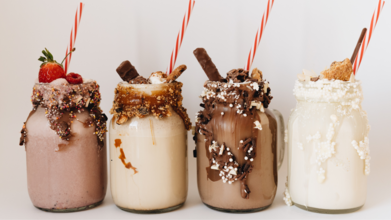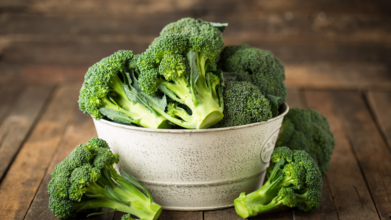- Health Conditions A-Z
- Health & Wellness
- Nutrition
- Fitness
- Health News
- Ayurveda
- Videos
- Medicine A-Z
- Parenting
- Web Stories
This Component In Red Wine Lowers Your Cholesterol

Credit: Canva
If you have heard that red wine decreases your cholesterol level, there are chances that you must have heard about Resveratrol- a plant-based component in red wine. Found in red wine, grapes, and certain berries, this component has gained attention for its stand-alone health benefits. There is empirical evidence that suggests that it may support heart health, brain function, and even longevity.
Here Are Science-Backed Benefits Of Resveratrol
May Help Lower Blood Pressure
Due to its antioxidant properties, resveratrol has shown promise in supporting cardiovascular health. A 2015 review found that high doses of resveratrol may reduce systolic blood pressure—the pressure exerted on artery walls when the heart beats. This effect is believed to be linked to an increase in nitric oxide production, which helps relax blood vessels. However, experts caution that more research is needed before specific dosage recommendations can be made.
Supports Healthy Cholesterol Levels
Studies in animals suggest that resveratrol may improve blood lipid profiles by lowering total cholesterol and increasing “good” HDL cholesterol. Research indicates that the compound may reduce the impact of an enzyme responsible for cholesterol production while also decreasing LDL oxidation, a key contributor to arterial plaque buildup. In human studies, resveratrol-enriched grape extract led to reductions in LDL cholesterol and oxidative damage, further supporting its potential cardiovascular benefits.
May Promote Longevity
The link between resveratrol and lifespan extension has been a significant focus of scientific inquiry. Research shows that it activates certain genes associated with aging and longevity, similar to the effects of calorie restriction. While animal studies demonstrate increased lifespan in some species, particularly those less related to humans, the impact of resveratrol on human longevity remains unclear.
Potential For Brain Protection
Several studies suggest that resveratrol could help protect against age-related cognitive decline. The compound’s antioxidant and anti-inflammatory properties may play a role in slowing the progression of neurodegenerative conditions like Alzheimer’s disease. Additionally, resveratrol appears to interfere with beta-amyloid protein fragments, which contribute to plaque formation in the brain. However, questions remain about how effectively the human body absorbs and utilizes resveratrol from supplements.
May Improve Insulin Sensitivity
Animal research indicates that resveratrol may benefit individuals with diabetes by enhancing insulin sensitivity and reducing complications. It may achieve this by inhibiting an enzyme responsible for converting glucose into sorbitol, a sugar alcohol that can cause oxidative stress when accumulated in excess. Additionally, resveratrol has been found to activate AMPK, a protein that aids glucose metabolism and helps regulate blood sugar levels.
Could Help Ease Joint Pain
Arthritis sufferers may benefit from resveratrol’s potential ability to protect cartilage from deterioration. Studies have shown that resveratrol supplementation may reduce inflammation and slow cartilage breakdown, which are key factors in joint pain and reduced mobility. While animal studies show promising results, further human research is necessary to confirm these findings.
Explored for Cancer Prevention
Preliminary research suggests that resveratrol might have anti-cancer properties. Studies in animals and test tubes indicate that it may inhibit cancer cell growth, alter gene expression to suppress tumor development and interfere with hormone-related cancer progression. However, the majority of these studies have been conducted outside of human trials, making it too early to determine its effectiveness in cancer prevention or treatment.
Like Drinking Milkshakes? Just One Is Enough Threat To Your Brain

Credits: Canva
Milkshakes may be a nostalgic treat, but new research warns they might be doing more harm than good to your brain. And no, we’re not just talking about the dreaded brain freeze.
A recent study published in The Journal of Nutritional Physiology found that just one high-fat milkshake can impair blood vessel function in a matter of hours. The results are a wake-up call about how quickly a single indulgent meal can impact both heart and brain health.
The “Brain Bomb” Experiment
Researchers tested two groups of men, 20 participants between ages 18 and 35, and 21 participants between ages 60 and 80. Each volunteer consumed what scientists described as a “high-fat milkshake.”
This wasn’t your average dessert order, the concoction was made with:
- 350 ml of heavy whipping cream
- 2 tablespoons of chocolate syrup
- 1 tablespoon of granulated sugar
- 1 tablespoon of instant non-fat dry milk
Each shake packed 1,362 calories, 48 grams of carbohydrates, and 9.5 grams of protein. The researchers even gave it a nickname, the “brain bomb.”
What Happened After Drinking the Shake
Before participants drank the shake, researchers measured their blood flow using ultrasound. They repeated the test four hours later, this time while the participants performed squats.
The results were striking: blood vessels showed a reduced ability to constrict and relax properly, a sign of impaired vascular function. This effect was seen in both younger and older participants, but was about 10% more pronounced in the older group.
The study authors noted that this kind of impairment could cause brief fluctuations in blood pressure — meaning too little or too much blood might reach the brain for short periods.
Why Blood Vessel Function Matters for the Brain
Healthy blood vessels are key for regulating blood pressure and ensuring a steady flow of oxygen to the brain. When they don’t work properly, the brain can experience short-lived episodes of poor blood flow. Over time, this can raise the risk of:
Stroke – caused by restricted or blocked blood flow
Cognitive decline – reduced oxygen supply can damage brain cells
Dementia – impaired blood circulation has been linked to vascular dementia
“Swings in blood pressure become harder to manage,” the researchers explained. “That can mean brief episodes of too little or too much blood reaching the brain. Over time, this increases the risk of developing conditions like stroke and dementia.”
Not Just About Long-Term Health
One of the key takeaways from this study is how immediate the effects were. The researchers emphasized that even a single high-fat meal, not just a long-term unhealthy diet, can have measurable consequences.
“Our study offers a timely reminder that diet doesn’t just shape our long-term health. It also affects our body and brain in real time. And as we’re learning, when it comes to protecting brain health, every meal may count,” the scientists wrote.
Should You Avoid Milkshakes Completely?
While this study sounds alarming, experts stress that the occasional indulgence is not necessarily harmful. The problem arises when high-fat, high-calorie meals become a regular part of the diet.
A single milkshake might not cause lasting damage, but repeated exposure to high-fat foods could keep blood vessels in a near-constant state of stress, increasing the risk of heart disease, stroke, and cognitive issues over time.
Think Before You Sip
This research highlights a critical point, our brain health is impacted by what we eat, meal by meal. That creamy milkshake might feel like comfort food, but it could be temporarily reducing blood flow to your brain within hours.
If you enjoy milkshakes, consider making lighter versions with lower-fat milk or plant-based alternatives, or save them for rare occasions rather than a frequent treat. Your brain, and your heart, may thank you for it.
'Stop Eating These Snacks At 6 Pm' Gastroenterologist Reveals 10 Healthy Snack Alternatives To Have Instead

(Credit-Canva)
Evenings at home are often filled with guests, friends, peaceful strolls and conversations to wind down after work. During these times, most of us have found ourselves strolling into markets and finding whatever street food we find appetizing and eating it. Although it is not often that you may snack like this, these evening snacks can be a major setback for our health.
However, what can one eat during this time? Evening snack cravings are tough to beat, and it's easy to reach for fried or sugary foods that taste great in the moment but aren't good for you. In a recent Instagram video, Gastroenterologist Dr. Pal pointed out that popular Indian snacks like samosas, jalebi, pani puri, vada pav, kachoris, fried momos, and namkeen mixtures should be avoided. He also included common fast foods like burgers and butter-heavy pav bhaji on his list.
However, having these once in a while may not seem like a big issue, it eventually adds up, causing you to not only increase your calorie count for the day, but also causing you to increase your fat and sugar content. But why should one avoid high levels of these components if we need them for our body to function?
Why You Should Avoid Foods With High Sugar And Fat Content
According to an American Diabetes Association 2021 review, looked into how fried foods to health problems like type 2 diabetes, though the results have sometimes been mixed. They conducted a controlled trial with 117 young, overweight adults. One group ate meals with fried meat, while the other group ate the same meals with meat that was boiled, steamed, or served with sauce. Both groups’ meals were otherwise identical and healthy.
After four weeks, both groups saw improvements in their health, likely because they were eating healthier overall. However, the group that ate fried meat showed less improvement in key markers of glucose (blood sugar) control and insulin resistance. This suggests that eating fried meat can negatively affect how your body manages sugar. The study also found some key differences in the fried meat group:
Gut Health
They had a lower variety of gut bacteria and different bacterial structures, including a higher ratio of bacteria often linked to type 2 diabetes.
Inflammation
They had higher levels of inflammation and a lower reduction in certain gut toxins, which are known to be harmful.
Body Signals
They also had less of a hormone that helps regulate appetite and sugar intake.
These findings suggest a potential link between fried food, changes in gut bacteria, and the body’s ability to handle sugar. The researchers also tested this on mice and found similar results, which adds even more support to their conclusions.
Healthy Evening Snack Alternatives You Can Try
Dr. Pal explained that while these snacks may be comforting, they are high in oil, sugar, and calories, which can lead to weight gain, poor heart health, and other issues. Instead of these unhealthy options, he suggests a variety of satisfying and nutritious alternatives. His recommendations include:
- Steamed Wheat Momos
- Chicken & Veggie Lettuce Wraps
- Chana Chaat
- Steamed Masala Corn
- Sprout Salad
- Paneer Tikka Grilled With No Oil
- Homemade Veg Soup
- Stuffed Basan Cheela (Paneer/ Veggies)
- Egg Bhurji With Whole-Wheat Toast
- Roasted Makhana
Can Broccoli, Cauliflower, Kale, And Cabbage Prevent Colon Cancer?

Credits: Canva
With the Russian cancer vaccine Enteromix that could prevent colon cancer, more and more people are now talking about it. However, that's not just it, in fact, your diet too can be effective against colon cancer.
Broccoli and Brussels sprouts may finally earn a prime spot on your plate. A new meta-analysis suggests that eating cruciferous vegetables, including broccoli, cauliflower, kale, and cabbage, could significantly lower the risk of colon cancer, one of the deadliest cancers worldwide. The study is published in BMC Gastroenterology.
Colon Cancer: A Global Health Concern
Colon cancer (also known as colorectal cancer) remains the third most common cancer globally and the second leading cause of cancer-related deaths, claiming over 903,000 lives in 2022, according to the World Health Organization. Nearly 1.9 million people are diagnosed every year, and diet is considered one of the most important, and controllable, risk factors.
Read: Russian Cancer Vaccine Enteromix Could Prevent Colon Cancer, Details Inside
The Study: 17 Trials, Nearly 640,000 Participants
The study, published in BMC Gastroenterology, systematically reviewed 17 cohort and case, control studies involving more than 639,000 participants, including 97,595 colon cancer cases.
Researchers discovered that those who consumed higher amounts of cruciferous vegetables had a 20% lower risk of developing colon cancer compared to those with the lowest intake.
Interestingly, the benefits were dose-dependent, meaning the risk reduction was greatest between 20–40 grams per day, roughly half a cup of cooked broccoli or two to three cups of raw kale. The protective effect plateaued between 40 and 60 grams, with no significant additional benefit beyond that amount.
Why Cruciferous Vegetables Protect the Gut
Cruciferous vegetables are part of the Brassicaceae family and include broccoli, Brussels sprouts, cabbage, cauliflower, kale, bok choy, and mustard greens. They are packed with fiber, vitamin C, carotenoids, and flavonoids, but what makes them special are glucosinolates-sulfur-containing compounds that break down into isothiocyanates (ITCs), including sulforaphane, when chewed.
Also Read: World Physiotherapy Day 2025: Themes, Significance And History
“These bioactive compounds have been shown to block enzymes that activate carcinogens, trigger cancer cell death, inhibit the growth of new blood vessels that feed tumors, and stop abnormal cell growth,” explains Dr. Supriya Rao, a quadruple board-certified gastroenterologist to Yahoo News.
Nutrition expert Elizabeth Harris, M.S., R.D.N., also told the media outlet that a fiber-rich, plant-forward diet supports healthy gut bacteria, reduces inflammation, and promotes regular bowel movements, factors known to protect against colorectal cancer.
Regional Differences in Risk Reduction
Interestingly, researchers noticed geographical variations in the results. The protective effect was most prominent in North America and Asia, while the data was less consistent in Europe and Australia. Experts suggest this could be due to differences in cooking methods, dietary patterns, or genetic factors.
“While the study strengthens the evidence that diet plays a role in colon cancer prevention, results should be interpreted with caution due to variations in study design and dietary assessment,” the authors note.
Adding Cruciferous Vegetables to Your Diet
Dietitians say incorporating these vegetables into meals doesn’t have to be boring.
“For a quick side dish, toss broccoli with olive oil and roast or air-fry until crispy,” suggests food scientist Jennifer Pallian, B.Sc., R.D, as reported in Yahoo News. “Try a simple beef and broccoli stir-fry for dinner, or blend kale into a smoothie for an easy nutrient boost.”
Pallian also recommends pairing these veggies with a source of fat, like olive oil or tahini, to boost absorption of fat-soluble vitamins.
One caution: cruciferous vegetables may cause gas or bloating in some people. “Introduce them gradually and stay hydrated to improve digestion,” Harris advises.
Colon cancer is largely preventable through lifestyle choices, and diet plays a critical role. This study adds to growing evidence that even small, consistent amounts of broccoli and other cruciferous vegetables can offer a measurable protective effect.
Experts recommend aiming for at least 20–40 grams per day, a goal that’s as simple as adding a handful of broccoli to your lunch or dinner.
“Consistency matters more than quantity,” Dr. Rao concludes. “Small changes made every day add up to long-term protection.”
© 2024 Bennett, Coleman & Company Limited

